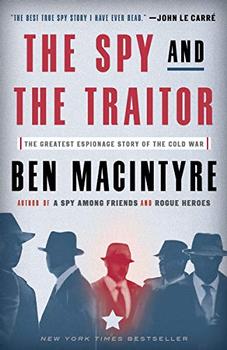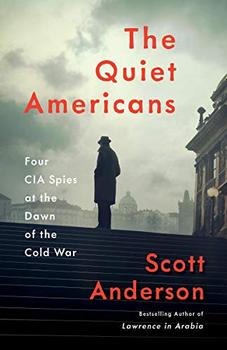Summary | Excerpt | Reviews | Beyond the book | Read-Alikes | Genres & Themes | Author Bio

The Greatest Espionage Story of the Cold War
by Ben MacintyreThe celebrated author of Double Cross and Rogue Heroes returns with his greatest spy story yet, a thrilling Americans-era tale of Oleg Gordievsky, the Russian whose secret work helped hasten the end of the Cold War.
If anyone could be considered a Russian counterpart to the infamous British double-agent Kim Philby, it was Oleg Gordievsky. The son of two KGB agents and the product of the best Soviet institutions, the savvy, sophisticated Gordievsky grew to see his nation's communism as both criminal and philistine. He took his first posting for Russian intelligence in 1968 and eventually became the Soviet Union's top man in London, but from 1973 on he was secretly working for MI6. For nearly a decade, as the Cold War reached its twilight, Gordievsky helped the West turn the tables on the KGB, exposing Russian spies and helping to foil countless intelligence plots, as the Soviet leadership grew increasingly paranoid at the United States's nuclear first-strike capabilities and brought the world closer to the brink of war. Desperate to keep the circle of trust close, MI6 never revealed Gordievsky's name to its counterparts in the CIA, which in turn grew obsessed with figuring out the identity of Britain's obviously top-level source. Their obsession ultimately doomed Gordievsky: the CIA officer assigned to identify him was none other than Aldrich Ames, the man who would become infamous for secretly spying for the Soviets.
Unfolding the three-way gamesmanship between America, Britain, and the Soviet Union, and culminating in the gripping cinematic beat-by-beat of Gordievsky's nail-biting escape from Moscow in 1985, Ben Macintyre's latest may be his best yet. Like the greatest novels of John le Carré, it brings readers deep into a world of treachery and betrayal, where the lines bleed between the personal and the professional, and one man's hatred of communism had the power to change the future of nations.
Spy stories are seldom conveyed with such accuracy and depth. The Spy and the Traitor might be appealing to readers with an interest in nonfiction books about politics and international affairs, as well as those who enjoy thrillers and crime fiction...continued
Full Review
 (756 words)
(756 words)
(Reviewed by Jamie Chornoby).
 The Spy and the Traitor: The Greatest Espionage Story of the Cold War by Ben Macintyre untangles the case of Soviet Union/KGB agent turned British/MI6 spy, Oleg Gordievsky. However, little attention is given to why and how The Union of Soviet Socialist Republics (USSR) was formed and to what extent its realities aligned with the communist framework envisaged by its founders.
The Spy and the Traitor: The Greatest Espionage Story of the Cold War by Ben Macintyre untangles the case of Soviet Union/KGB agent turned British/MI6 spy, Oleg Gordievsky. However, little attention is given to why and how The Union of Soviet Socialist Republics (USSR) was formed and to what extent its realities aligned with the communist framework envisaged by its founders.
Going into the 20th century, Russia struggled with extreme inequality under a Tsarist autocracy. A primarily agricultural nation, industrialization slowly trickled into Russia in the late 19th century, which furthered class conflict. In this society, social structures were fixed and rigid, with a small ruling/upper class and teeming underclass of serfs. Void of ...

If you liked The Spy and the Traitor, try these:

by Ronald Drabkin
Published 2025
In the spirit of Ben Macintyre's greatest spy nonfiction, the truly unbelievable and untold story of Frederick Rutland—a debonair British WWI hero, flying ace, fixture of Los Angeles society, and friend of Golden Age Hollywood stars—who flipped to become a spy for Japan in the lead-up to the attack on Pearl Harbor.

by Scott Anderson
Published 2021
From the bestselling author of Lawrence in Arabia, a gripping history of the early years of the Cold War, the CIA's covert battles against communism, and the tragic consequences which still affect America and the world today.
The worth of a book is to be measured by what you can carry away from it.
Click Here to find out who said this, as well as discovering other famous literary quotes!